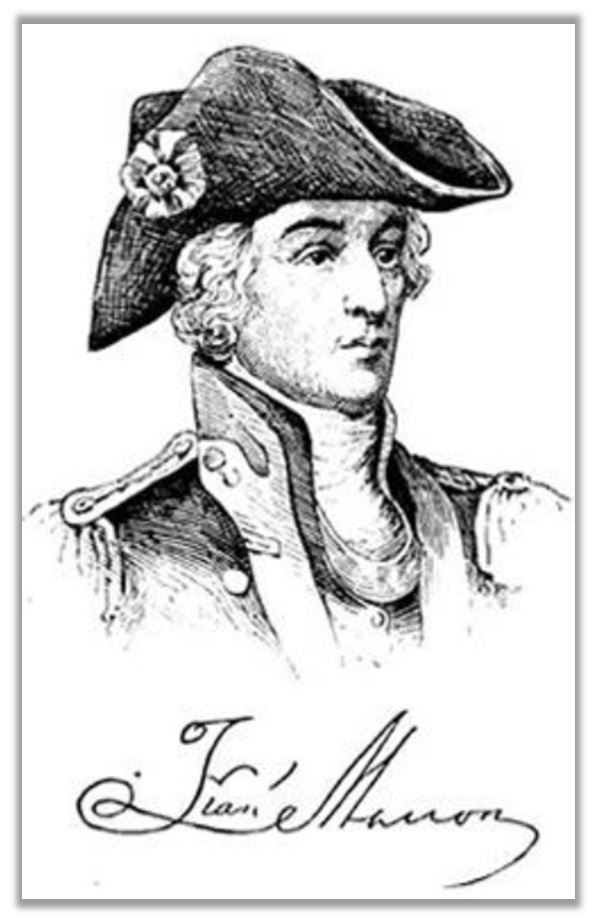TDIH: Swamp Fox raids Georgetown. Sort of.
The raid should have been a quick in-and-out affair, the type of guerrilla-style warfare that southern militia came to be known for. Instead, it took a somewhat humorous turn.
On this day in 1781, Patriot militia prepare to raid Georgetown, South Carolina. That raid should have been a quick in-and-out affair, the type of guerrilla-style warfare that southern militia came to be known for.
Instead, the raid took a somewhat humorous turn.
The British soldiers, as it would turn out, were perfectly happy to lose their commander when he was captured by the Americans. Those soldiers had been on the verge of mutiny anyway.
The raid occurred soon after General Nathanael Greene took command of Patriot forces in the South. Early on, Greene asked Lt. Col. Henry “Light Horse Harry” Lee (Continental Army) and Brig. Gen. Francis “Swamp Fox” Marion (militia) to work together.
The two men were complete opposites. “Lee was an educated Virginia gentleman,” one Marion biographer describes, “articulate both orally and in writing, whereas Marion, who had scant formal learning, said little and was at best adequate with the pen.” Moreover, Marion wore “threadbare clothing,” whereas Lee kept his men outfitted in nice uniforms. Yet the men had similarities as well. Both relied on “speed, agility, and bold maneuvers for success; both were strong believers in discipline; and both were solicitous of the lives and safety of their men, gaining their loyalty . . . .”
The partnership would work well overall, despite the bumpy start at Georgetown.
The small town had seemed like an obvious target. It was close to the Pee Dee River, lightly defended by 200 to 300 British soldiers under the command of Lt. Colonel George Campbell. Better yet, the town was a major producer of salt, a much-prized commodity during the war. Marion may have found extra motivation in one other factor: His sister lived there.
Marion and Lee put their plan into motion on January 23.
Lee’s infantry were the first to act. Ninety men under the command of Captains Patrick Carnes and John Rudulph were to travel down the Pee Dee towards Georgetown, with a handful of Marion’s men leading the way. Once there, they would hide in nearby rice fields and wait for the second prong of the attack to arrive.
Lee’s cavalry and the rest of Marion’s men were the second prong, and they planned to follow on horseback the next day. Unfortunately, muddy roads bogged them down and delayed their arrival at Georgetown.
That delay would cause problems.
Lee’s infantry began the attack before Lee and Marion arrived. Americans quickly captured the British commander, still in his bed. They expected other British soldiers to emerge from their lodgings and run for the fort: They would take the soldiers as they emerged. To their astonishment, Lee would later describe, “not a British soldier appeared; not one attempted either to gain the fort, or repair to the commandant.”
Those British soldiers simply barricaded themselves wherever they were. Not a single soldier, it appears, had any interest in defending Campbell. Instead, they simply waited.
When Lee and Marion finally arrived, it was too late to help. They’d wanted a quick, bold operation under cover of darkness. Instead, they were faced with a difficult daytime operation. They withdrew from the area. The British commander was still their captive, but they let him go on parole.
Naturally, this wouldn’t be Americans’ last attempt to reclaim control of Georgetown. The Swamp Fox would finally take the city in May 1781.
Naturally, that is a story for another day.
Sources can always be found on my website, here.



I can imagine a Commander being so bad that his own men wouldn't defend him. They must have had it bad to willingly let Col. Campbell go. House to House fighting in the toughest kind when the civilians are in the houses along with the British. It will be with anticipation that I wait for the eventual victory over Georgetown. Thank you Tara.
I love the history of the American Revolution in the South - especially South Carolina. Both my wife and I had ancestors that participated in that conflict as Patriots.
The movie that depicts some of the sentiment of that theater of operation starring Mel Gibson, The Patriot, shows some of the angst and suffering that occurred in SC as it became a civil war. Families were torn in their allegiance to King or to country with brother fighting brother and neighbor fighting neighbor. This was partially due to the treachery of the British commander in North America changing the terms of surrender after Charlestown was surrendered in 1780.
Thanks again, Tara Ross, for your great stories of history in the USA!